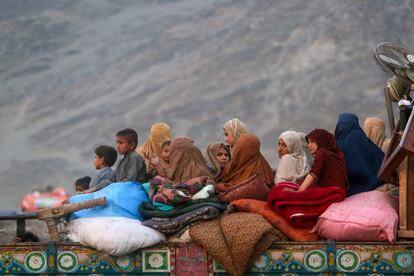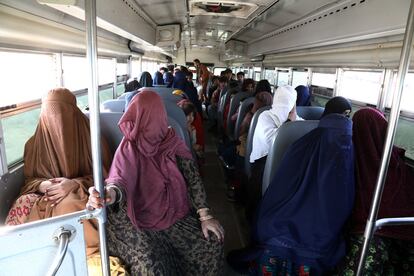The suffering of Afghans expelled from Pakistan: ‘Before they cross, all their belongings are taken away,’ UNHCR reports
Thousands of people are returning to Afghanistan after the deadline given by the Pakistani authorities to irregular immigrants expires. The situation is aggravating the fragility of a country plunged into the abyss since the return of the Taliban

Thousands of people have streamed across the border with Afghanistan every day since the deadline imposed on undocumented immigrants by the Pakistani authorities expired. Any refugees still living in Pakistan without the necessary paperwork are now under penalty of being expelled. Some of those returning had gone into exile after the Taliban returned to power in August 2021. Others, according to humanitarian workers on the ground, had been living in Pakistan for “more than 30 years” and have been forced to return with children and grandchildren who had never set foot in their homeland. “I use the adjective ‘dire’ to describe what is happening, people returning to a place they do not want to return to, often with nothing,” explains Thamindri de Silva, national director of the NGO World Vision in Afghanistan, in a telephone interview with this newspaper after her visit to the Afghan Torkham crossing, on the border with Pakistan.
“Before crossing, they [the Pakistani authorities] take away all their belongings, including jewelry and money, and only give them $100 (about €94) to leave Pakistan,” de Silva remarks. It is an accusation that has also been confirmed by Caroline Gluck, who works for the UNHCR (the U.N. refugee agency), after visiting the same border crossing. “The refugees have told us that they are stripped of everything,” which means that they arrive without the means to survive in a country where 15 million people — out of a population of about 40 million — already depend on humanitarian aid, she explains in a telephone conversation.
Despite this, Gluck continues, they decide to leave Pakistan because “the authorities’ punishment for those who stay seems very severe. A woman told me that she came because they told her that if she didn’t leave they would destroy, burn, and tear down her house. Others were threatened with being taken to prison,” she explains. Humanitarian organizations and Afghan refugees report that there is a massive campaign of arrests in the country to force the departure of those who do not have residence permits. These account for approximately 1.7 million Afghans of the estimated 4.4 million who live in Pakistan.
Helai, a young Afghan woman who is currently living in Pakistan despite not having a visa, confirms this campaign of persecution. “Afghans in Pakistan face many risks. The police mistreat us in the street. If they stop you, they take you [to the police station] and take your money and jewelry. Those who do not have a visa are expelled. They don’t care about separating a mother from her son or a son from his mother,” she says in an audio call on WhatsApp.
The Taliban authorities and the International Organization for Migration are managing arrivals, registering returnees, trying to facilitate their transportation to other cities, and setting up tents for those who arrive, Gluck confirms. Although there is no exact data on how many people have returned to Afghanistan, Pakistan’s interim Prime Minister Anwaarul Haq Kakar announced on Wednesday that “about 252,000″ people had already left the country, the vast majority of whom are estimated to be women. “With no alternative and after having their lives turned upside down, there are families who are improvising a shelter in the dry bed of a river near the border, because there are not enough tents for everyone or enough latrines, but with the winter rains just around the corner, the risk is enormous,” warns de Silva.

The timing of the deportations, which the Pakistani authorities have justified as a response to the increase in terrorist attacks for which they blame the Taliban, “could not be less opportune,” Gluck maintains. “Winter in Afghanistan is brutal. Last year was the coldest in 15 years, and temperatures dropped to 22 degrees below zero Fahrenheit in some places. And if you don’t have shelter or money to stay warm, the situation is very difficult,” she says.
In addition to not having enough money to settle in the country, “many families are separated before they arrive,” says de Silva, who recalls the case of “a woman who has just returned alone with her eight children because her husband has been imprisoned in Pakistan. I asked this woman what her plan was, and she told me ‘none,’ that she didn’t know what to do,” the veteran humanitarian worker says. She also highlights the especially difficult situation for women in Afghanistan, whom the Taliban regime has banned from working in most sectors.
Humanitarian organizations agree that the “uprooting” suffered by Afghan refugees is overwhelming. “I met a family of 10 people, in which the mother had lived in Pakistan for 40 years, her children and grandchildren had all been born in this country,” says Gluck. As the UNHCR worker was told, “many had jobs in Karachi, but were forced to leave their jobs overnight to return to a country they had not seen in decades or had never even visited. They have to start from scratch because they have nothing, and their main concern is to find work to support their family and pay the rent for a house and meet the needs of daily life,” she adds.
‘Prisoners’ in Pakistan
Helai and Roya, two 23-year-old Afghan graduates in Hispanic Linguistics, have risked remaining in Pakistan for the moment. In December last year, they fled Afghanistan days after the Taliban banned women from studying at university. They did so without their degrees, because when they tried to collect them at the University of Kabul, the Taliban beat them. Neither of them has a visa in Pakistan, since when they tried to renew their entry permits, they were denied.
Since November 1, they claim that they have been living like “prisoners,” unable to leave the house “for fear of being detained” by the Pakistani authorities, Roya says in a WhatsApp audio conversation. “Our situation is terrible. Helai and I tried by all legal means to regularize our situation and obtain a visa, but there was no way. The government of Pakistan is not giving visas to any Afghans. The Pakistanis don’t rent their houses to Afghans either,” explains Roya, who lives hidden with her friend in the home of another Afghan woman who does have a residence permit in Pakistan and who can go out to buy food.
Returning to Afghanistan is not an option. “We can't go back. Our lives are in danger because the Taliban have threatened us because of the contacts we have with journalists from Spain and many other countries. It has been almost a year since we made an appointment with the Spanish Embassy [to request international protection] but, unfortunately, they have not called us yet for that appointment,” explains Helai.
If they return, the consulted organizations insist, they will do so to a country that “is going through crisis after crisis.” On October 7, the same day that Hamas attacked southern Israel, Afghanistan suffered several earthquakes in the west of the country that left thousands dead and thousands homeless. “The war in Gaza has overshadowed the situation in Afghanistan,” says Gluck, who maintains that funding to respond to the humanitarian crisis is not reaching this Asian country. “All U.N. agencies in the country, including the UNHCR, face serious funding problems,” she acknowledges. This setback has also been suffered by World Vision. “We don’t have a single donor,” de Silva laments. And she concludes: “But life goes on for the Afghans, and every day they have to face yet another problem.”
Sign up for our weekly newsletter to get more English-language news coverage from EL PAÍS USA Edition
Tu suscripción se está usando en otro dispositivo
¿Quieres añadir otro usuario a tu suscripción?
Si continúas leyendo en este dispositivo, no se podrá leer en el otro.
FlechaTu suscripción se está usando en otro dispositivo y solo puedes acceder a EL PAÍS desde un dispositivo a la vez.
Si quieres compartir tu cuenta, cambia tu suscripción a la modalidad Premium, así podrás añadir otro usuario. Cada uno accederá con su propia cuenta de email, lo que os permitirá personalizar vuestra experiencia en EL PAÍS.
¿Tienes una suscripción de empresa? Accede aquí para contratar más cuentas.
En el caso de no saber quién está usando tu cuenta, te recomendamos cambiar tu contraseña aquí.
Si decides continuar compartiendo tu cuenta, este mensaje se mostrará en tu dispositivo y en el de la otra persona que está usando tu cuenta de forma indefinida, afectando a tu experiencia de lectura. Puedes consultar aquí los términos y condiciones de la suscripción digital.








































